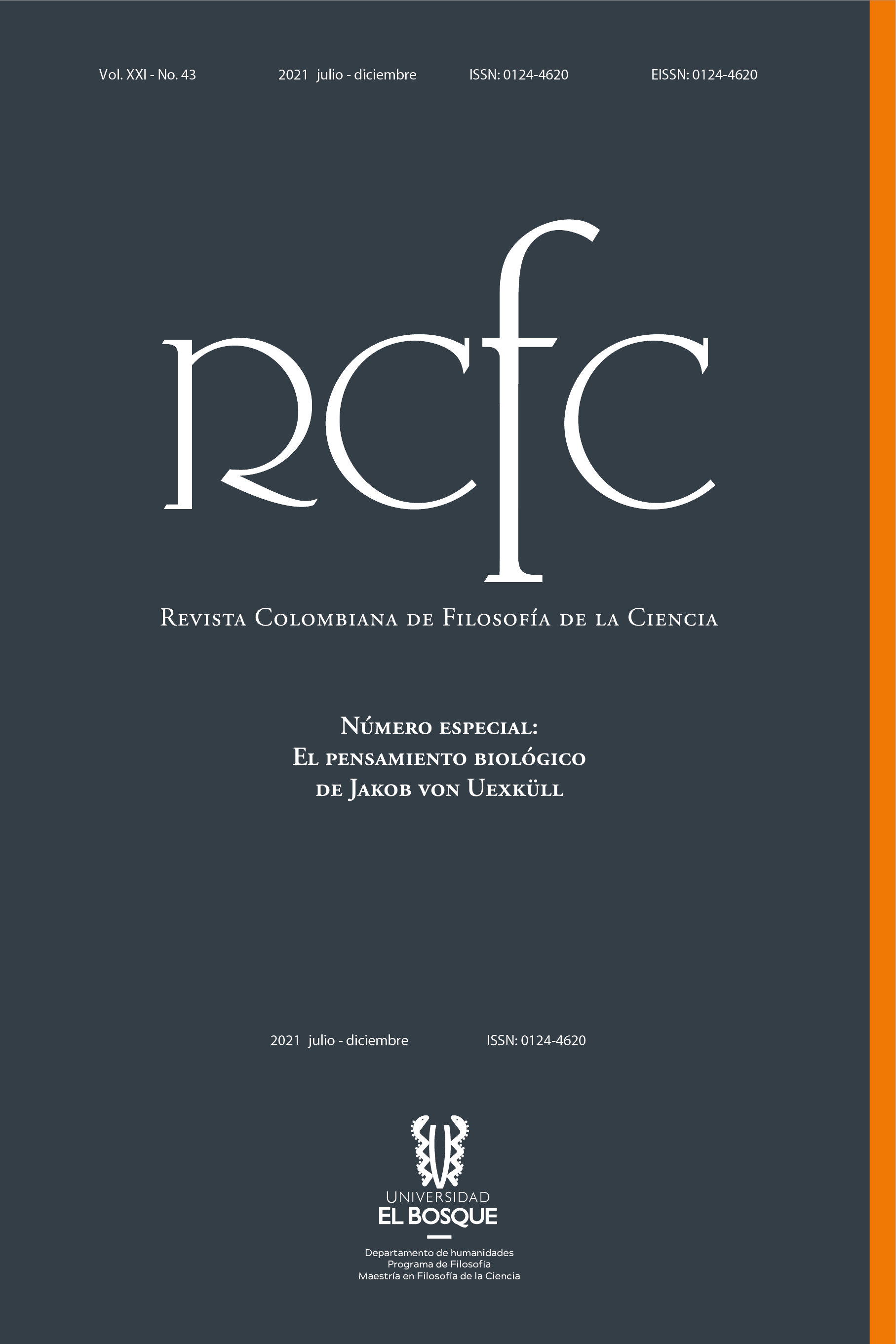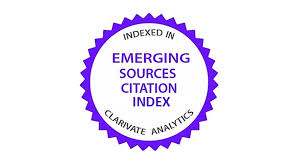A Biologia Kantiana de Jakob von Uexküll
DOI:
https://doi.org/10.18270/rcfc.v43i21.3452Palabras clave:
Uexküll, Kant, Biologia, Epistemologia, Organismo, Experiência, SujeitoResumen
Como proposta, o artigo procura mostrar em que sentido a biologia teórica de Uexküll expande princípios da epistemologia kantiana: a ideia de que a estrutura cognitiva referente à organização da experiência sensorial não se restringe ao ser humano e incluiria também formas orgânicas não-humanas. De um ponto de vista metodológico, Uexküll estabelece as bases de uma teoria geral do organismo que conjuga elementos da epistemologia kantiana e observações fisiológicas. Como estratégia de desenvolvimento deste artigo, em particular, vamos explorar a continuidade entre a fundamentação kantiana da biologia teórica (1926) e a teoria de Umwelt (1934).
Descargas
Referencias bibliográficas
Berthoz, Alain., y Petit, Jean-Luc. Phénoménologie et Physiologie de l'Action. Paris: Odile Jacob, 2006.
Brentari, Carlo. Jakob von Uexküll: The Discovery of the Umwelt Biosemiotics and Theoretical Biology. Dordresch: Springer, 2015.
Bruner, Jerome. Actual Minds, Possible Worlds. Harvard: Harvard University Press, 1986.
Descartes, René. El Tratado del Hombre [1664]. Madri: Alianza Universitária, 1990.
Fechner, Gustav Theodor. Elements of Psychophysics 1966. Vol. I, Trad. H.E. Adler. New York: Holt, Rinehart & Winston.
Gibson, James J. The Ecological Approach to Visual Perception. Boston: Houghton-Mifflin, 1979.
Goodman, Nelson. Way of Worldmaking. Indianapolis: Hackett, 1978.
Griffin, Donald R. Animal Minds. Chicago: Chicago University Press, 1992.
Heidelberger, Michael. Nature from within. Eds. Gustav Theodor, Fechner and His Psychophysical. Trad. Cynthia Klohr. Pittsburgh: University of Pittsburgh Press, 2004.
Hoffe, Otfried O. Immanuel Kant. São Paulo: Martins Fontes, 2005
Johnson, Mark. The Body in the Mind. Chicago: Chicago University Press, 1990.
_____. Embodied Mind, Meaning, and Reason. Chicago: The University of Chicago Press, 2017.
Kant, Immanuel. Crítica da faculdade do juízo. Rio de Janeiro: Forense Universitária, 1993.
Koutroufinis, Spyridon, “Modern Biological Neo-Teleologism vs. Aristotle’s Genuine Telos”. Biocosmology – Neo-Aristotelism 6.3/4 (2016): Online.
Kull, Kalevi. “Jakob von Uexküll: An Introduction”. Semiotica 134.1/4 (2001): 1-59. <https://doi.org/10.1515/semi.2001.013>
Marcus, Solomon. “On the Logical and Semiotic Status of Jakob von Uexküll’s Concept of Umwelt”. Semiotica 134–1/4 (2001): 201–210.
Mayr, Ernst. Towards a New Philosophy of Biology. Cambridge, MA: Harvard University Press, 1988.
Menary, Richard. “Introduction to the special issue on 4E cognition”. Phenom Cogn Sci 9.4 (2010):459–463
Merleau-Ponty, Maurice. A Natureza – curso do Collège de France. São Paulo: Martins Fontes, 2000.
Newen, Albert, de Bruin, Leon De. and Gallagher, Shaun. The Oxford Handbook of 4E Cognition. Oxford (UK): Oxford University Press, 2018.
O’Neil, Joseph. “Translator’s Introduction”. Uexküll, J. von. A Foray into the Worlds of Animals and Humans. Minniapolis: Minniapolis University, 2010.
Stewart, John. “Foundational Issues in Enaction as a Paradigm for Cognitive Science”. Enaction – Toward a New Paradigm for Cognitive Science. Ed. Stewart, J.; Gapenne, O. Di Paolo, E. Cambridge: The MIT Books, 2010.
Thom, René. Paraboles et Catastrophes – Entretiens sur les mathématiques, la science et la philosophie. Paris: Flammarion, 1983.
Thompson, Evan., y Stapleton, Mog. “Making Sense of Sense-making: Reflections on Enactive and Extended Mind Theories”. Topoi 28.1 (2009): 23–30. <https://doi.org/10.1007/s11245-008-9043-2>
Uexküll, Jakob von. Theoretical Biology. London/New York: K. Paul, Trench, Trubner & Co. ltd., Harcourt. Brace & company, inc., 1926
______. Dos animais e dos homens 1934. Lisboa: Edições Livros do Brasil, 1982.
______. Ideas para una concepción biológica del mundo. Buenos Aires: Espasa Calpe, 1945.
Uexküll, Thure von. A teoria da Umwelt de Jakob Von Uexküll. Galáxia – Revista Transdisciplinar de Comunicação, Semiótica e Cultura, São Paulo: Educ, n. 7, p. 19-48, 2004.
Vaidman, Lev, “Many-Worlds Interpretation of Quantum Mechanics”, The Stanford Encyclopedia of Philosophy (Fall 2018 Edition), Edward N. Zalta (ed.), URL = <https://plato.stanford.edu/archives/fall2018/entries/qm-manyworlds/>.
Whitehead, Alfred North. Symbolism, Its Meaning and Effect. New York: Macmillan, 1927.
______. Science and the modern world. New York: Pelican Mentor Books, 1948.
William, James. The Pluralistic Universe. New York: Longmans, Green, And Co., 1909.
Wolfe, Charles T. Do organisms have an ontological status? History and Philosophy of the Life Sciences 32.1 (2010): 2-3.
Descargas
Publicado
Cómo citar
Número
Sección
Licencia

Esta obra está bajo una licencia internacional Creative Commons Atribución-NoComercial-SinDerivadas 4.0.

| Estadísticas de artículo | |
|---|---|
| Vistas de resúmenes | |
| Vistas de PDF | |
| Descargas de PDF | |
| Vistas de HTML | |
| Otras vistas | |











